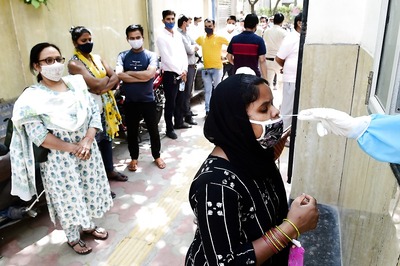
views
Tokyo/Fukushima: Scrambling hard to tackle its worst atomic crisis, Japan on Wednesday said it will scrap the four stricken reactors at the quake-hit Fukushima nuclear facility, as radiation seeping into seawater reached its highest level yet and the President of the troubled plant's operator hospitalised.
Tokyo Electric Power Company (TEPCO), the plant’s operator, said that it will decommission the four reactors at the plant, more than two weeks after the monster magnitude-9 quake and tsunami struck Japan's northeast leaving nearly 30,000 people dead or unaccounted for.
"We have no choice but to scrap reactors 1 to 4 if we look at their conditions objectively," Tsunehisa Katsumata, the company's Chairman, said at a press conference.
His remarks came hours after the company announced that its President, Masataka Shimizu, was hospitalised on Tuesday for hypertension and dizziness, the latest crisis to hit the embattled TEPCO, which is struggling hard to contain the atomic crisis.
His hospitalisation follow reports that 66-year-old Shimizu had fallen sick on March 16 and taken some days off from manning a liaison office set up between the government and the utility to regain control of the plant.
Katsumata has already taken over Shimizu's role temporarily in leading efforts to bring the crisis under control, the company said, adding that the President would return to work as soon as he recovers.
TEPCO said that while the cost of compensation in connection with the nuclear disaster will be daunting and undermine it financially, the company will try hard to remain afloat and avoid nationalisation, Kyodo reported.
After losing their cooling functions due to the deadly natural disaster on March 11, four of the six reactors at the nuclear power plant, 220 km northeast of Tokyo, have leaked radioactive materials into the air and sea.
As workers continued their efforts to prevent the reactors from overheating and restore their cooling systems, Katsumata apologised for the crisis at the plant.
"We apologise for causing the public anxiety, worry and trouble due to the explosions at reactor buildings and the release of radioactive materials," he said.
He said the company would make maximum efforts to restore the cooling systems of the Nos. 1-4 reactors to bring them into a stable condition called "cold shutdown". The Nos.5 and 6 reactors were already in a state of cold shutdown.
"Our greatest responsibility is to put everything into bringing the current situation to an end and under control," Katsumata said.
Meanwhile, radioactive iodine-131 at a concentration of 3,355 times the maximum allowable level under the law was detected on Tuesday in a seawater sample taken near the crisis-hit Fukushima plant, the government's nuclear agency said.
The highest concentration observed so far in seawater from the troubled plant suggests radiation originating from reactor cores, where fuel rods have partially melted, may have been continuously leaking into the Pacific Ocean, Kyodo said.
Hidehiko Nishiyama, a spokesman for the Nuclear and Industrial Safety Agency, said the exact cause of the high iodine concentration remains unknown but added that data taken by the plant operator indicated that radiation which has leaked at the site during the ongoing crisis somehow flowed into the sea.
He said the polluted seawater will not pose immediate health risks because fishing is not being conducted in the evacuation-designated area within 20 km of the plant and radiation-emitting substances would be "significantly diluted" by the time they are consumed by marine species and then by people.
"It is important that we keep monitoring radiation data, find out what caused the pollution as soon as possible and take measures to prevent the radiation levels from rising further," Nishiyama said.
Chief Cabinet spokesman spokesman Yukio Edano suggested that all of the reactors at the Fukushima nuclear plant should be scrapped.
"It is very clear looking at the social circumstances. That is my perception," Edano told reporters when asked if all six reactors at the troubled plant should be decommissioned.
Edano said it is expected to take "a considerable amount of time" before the temperatures of fuel rods in the reactor cores at the power station are lowered in a stable manner.
TEPCO has been pouring tonnes of coolant water into the reactors and spent nuclear fuel pools. But radiation contaminated water has been filling up buildings and trenches at the plant, obstructing work to restore the lost functions.
Serious damage to fuel rods from overheating could lead to the release of enormous amounts of radioactive materials into the air.
Edano said transferring the highly radioactive water to a tanker at sea is an option being studied by the government and nuclear experts.
He also said the experts have been examining the possibility of covering the reactors' buildings damaged by hydrogen explosions with special sheets to reduce the amount of radioactive particles being dispersed from the facility.
Meanwhile, US President Barack Obama and Japanese Prime Minister Naoto Kan discussed the situation on phone in their third conversation since the March 11 quake and tsunami.
They said their countries will continue to cooperate closely in dealing with the situation at the troubled nuclear power plant, national broadcaster NHK reported.
Obama said he is certain that Japan will rebuild itself, adding that the US is determined to provide necessary assistance to this country in both the short and long terms.



















Comments
0 comment